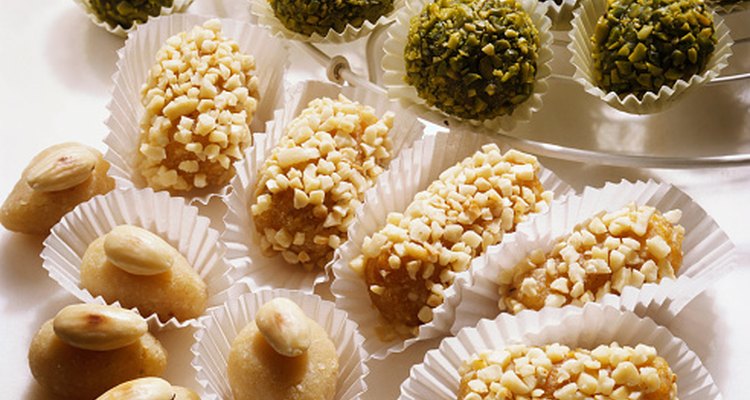
As a main ingredient in breads and biscuits, and in sweet treats like marzipan balls, cake frostings or almond cookies, almond paste is a versatile condiment to have in your pantry. The natural ingredients used to make almond paste provide sweet flavor for your recipes, but also limit the shelf life of this baking confection.
Recipes
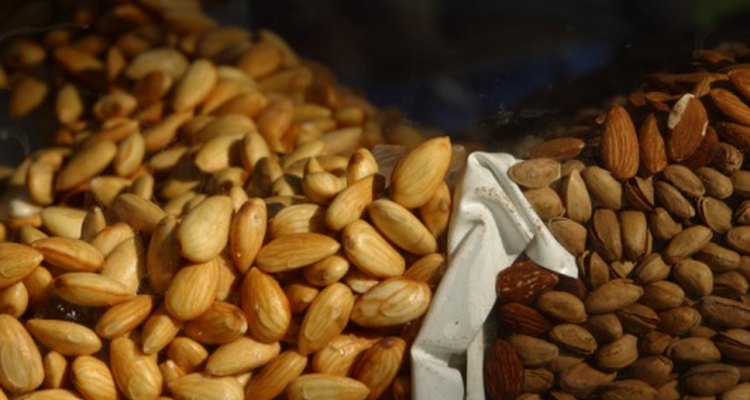
Homemade recipes using fresh ingredients are economical and easy to make right in your own kitchen. The ingredients include blanched almonds, sugar, almond extract and egg whites. In a food processor, combine the blanched almonds and sugar to make a fine powder. Slowly add almond extract and egg whites to the food processor until you have a smooth pasty consistency. A variation of the recipes include cooking a combination of sugar, almonds and water until it reaches a smooth consistency, with almond extract added for additional flavor. You can find commercially prepared almond paste in tubes or cans that can be stored in the refrigerator for up to a year.
Storage
Packaging is particularly important to the shelf life of your homemade almond paste. Place the paste in a tightly sealed container or plastic bag for longer-lasting almond paste. The average shelf life for homemade almond paste stored at room temperature is one week. This is particularly helpful if you want to use the paste, for instance, in a cake covering such as marzipan as it is easier to shape and mold. For continuing use, store the homemade almond paste in the refrigerator for up to one month. In order to make the cold almond paste more pliable, Ochef recommends kneading in corn syrup or rose water.
Almonds
While the shelf life of whole almonds averages 12 months if packaged tightly, almonds exposed to air and moisture, like those used to make almond paste, have a much shorter shelf life. Outside factors affect the shelf life of almonds, including exposure to air or moisture when the skin or shell is sliced or blanched. Oxygen reacts with the natural saturated fats in the almonds and increases the chances of mold development and rancidity.
Considerations
The USDA Food Safety and Inspection Service cautions against consuming raw eggs alone or in recipes, like some almond paste recipes, due to the chances of exposure to salmonella, a bacteria that causes food-borne illnesses. People with compromised or low immune systems are particularly susceptible to infection.
Related Articles
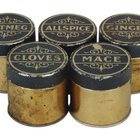
How to Make Sugared Almonds

How to Keep Almonds Fresh
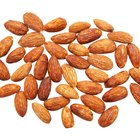
How to Shell Fresh Almonds
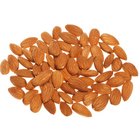
How to Cook Raw Almonds

How to Make Almond Buttercream Frosting
Do Almonds Ever Go Bad?

What Are Blanched Vs. Unblanched ...

How to Grind Almonds for Baking

How to Store Coconut Macaroons After ...
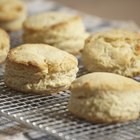
Butter Substitute for Baking Scones

How to Make Lactose Free Icing

Coconut Breakfast Cookies with Cacao ...

Can I Substitute Ground Almonds for ...
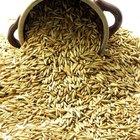
How to Store Oat Bran
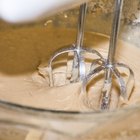
Adding an Almond Flavor in a Boxed Mix ...

How to Fix Watery Henna

Vegan Alternatives to Lanolin in ...
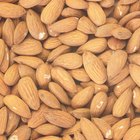
How to Grind Almonds for Baking

How Early Can You Make a Wedding Cake?

How to Store Henna Paste
References
Writer Bio
After attending the University of Missouri St. Louis, Stephanie Rempe worked as a documentation manager in the finance industry 10 years before turning to her first love, writing, which she's been doing professionally since 2008. She currently divides her time between Missouri and her fiance's hometown in Oregon. In addition to her freelance writing, Rempe is working on a romance novel and short stories.
Photo Credits
Eising/Photodisc/Getty Images